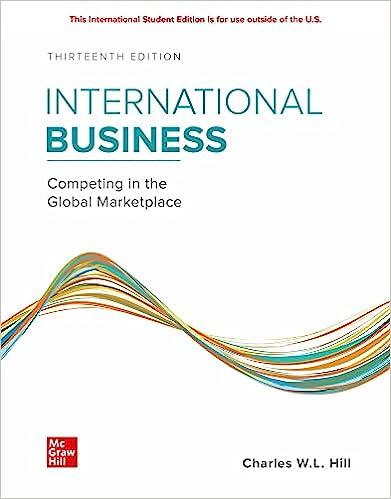The Shoprite Group is Africas largest food retailer, operating more than 2,300 stores in 15 countries across
Question:
This expansion has led to Deloitte’s Global Powers of Retailing ranking The Shoprite Group as the 94th largest retailer in the world and the largest in Africa. Some 76 percent of South Africa’s adult population shops at one of Shoprite’s supermarket brands.
Shoprite views the combination of controlling its own supply chain, investing in employee skills, investing in infrastructure, and incorporating value-added services to compliment the shopping experience as the recipe for financial success. And the company measures its financial success via a large set of traditional and nontraditional statistics. Some of the nontraditional outcome measures include serving a billion customers in a single year, donating food worth R109 million (about $9 million U.S. dollars), and 4.5 million free meals of soup and bread served by mobile kitchens.
The more traditional, expected outcomes include 108 new corporate stores opened in the last year, 4,833 new jobs created, sales growth of 14.4 percent, a profit increase of 15.0 percent, and an increase in return-on-shareholders’ equity of 19.2 percent. But Shoprite also counts the 1.8 million training hours invested in employees as a positive performance metric that has long-term financial implications.
Building on these financial and nonfinancial metrics, The Shoprite Group’s primary business is food retailing, but the Group’s financial success also depends on offering a broad range of products and services. For example, these include household products, furniture, pharmaceuticals, and financial services. In all endeavors, Shoprite has an unwavering dedication to providing the lowest prices to customers of all income levels across the 15 countries it serves in Africa and the Indian Ocean Islands.
Its financial success depends as much on repeat customers as it does on pursuing efficiency in everything that the company does. Shoprite’s advanced distribution centers and sophisticated supply chain infrastructure provide greater control over operations. This empowers Shoprite to overcome eventual economic challenges without compromising on quality. By setting the conditions for enduring success, Shoprite can provide affordable food to all communities, invest in social initiatives that help the communities in which they operate, and contribute to the African economy—all while creating value for all stakeholders. The Shoprite Group of companies have created tremendous financial success in what many other companies consider a weak buying power market, while also helping to socially develop local African communities.
Questions
Some 76 percent of South Africa’s adult population shops at one of Shoprite’s supermarket brands, and the Shoprite Group is the 94th largest retailer in the world and the largest in Africa. Yet, Shoprite is only in Africa and the Indian Ocean Islands. Should the company expand its global footprint? Can it be more financially successful worldwide with the same business model it operates in Africa?
Shoprite measures its financial success via a large set of traditional and nontraditional statistics. If you worked for Shoprite, how would you feel about being evaluated on the nontraditional statistics?
Shoprite has an unwavering dedication to providing the lowest prices to customers of all income levels across the 15 countries it serves in Africa and the Indian Ocean Islands. Usually low-cost firms get sidestepped at some point in the future by another company that can offer even lower costs. How can Shoprite ensure that the company is viable in the long-term with its low-cost approach?
The financial success of Shoprite depends as much on repeat customers as it does on pursuing efficiency in everything that the company does. Shoprite’s advanced distribution centers and sophisticated supply chain infrastructure provide greater control over operations. How can the supply chain infrastructure be leveraged to excel in financial performance?
Step by Step Answer:

ISE International Business Competing In The Global Marketplace
ISBN: 9781260575866
13th International Edition
Authors: Charles Hill





